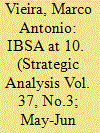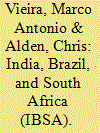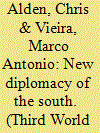|
|
|
Sort Order |
|
|
|
Items / Page
|
|
|
|
|
|
|
| Srl | Item |
| 1 |
ID:
120412


|
|
|
|
|
| Publication |
2013.
|
| Summary/Abstract |
This commentary engages with the IBSA model of South-South development assistance. It focuses on the IBSA Trust Fund to demonstrate the growing political relevance of the partnership in development assistance initiatives. This is followed by an analysis of Brazil's increasing participation in South-South development assistance in many developing countries around the world. I argue that the strategic mission for the IBSA states in the coming decades, as a new normative/ordering power in international relations, is to further its political authority and legitimacy by expanding and refining its South-South development assistance framework. This can be done by integrating new thinking on environmental sustainability as a central-albeit neglected-pillar of their common framework.
|
|
|
|
|
|
|
|
|
|
|
|
|
|
|
|
| 2 |
ID:
108963


|
|
|
|
|
| Publication |
2011.
|
| Summary/Abstract |
This article argues that the long-term sustainability of the trilateral partnership established in 2003 between India, Brazil, and South Africa (IBSA) rests on a more conscious engagement with their regional partners. The construction of a strong regional leadership role for IBSA based on its members' strategic positions in South Asia, South America, and southern Africa is the proper common ground to legitimize a diplomatic partnership between the IBSA states. This is even more pressing as China is actively competing for markets and influence with the IBSA trio within their respective regions, particularly in Africa. The paradox, though, is that while Northern powers have welcomed the regional leadership role of IBSA's members, most of their neighbors are not convinced of the actual intentions of New Delhi, Brasilia, and Pretoria. As a result, leadership within IBSA is defined in global terms as a claim to lead the developing world. At the regional level, however, IBSA's claim for leadership is less clear, less acceptable, and therefore remains constrained.
|
|
|
|
|
|
|
|
|
|
|
|
|
|
|
|
| 3 |
ID:
065726


|
|
|
| 4 |
ID:
101733


|
|
|
|
|
| Publication |
2011.
|
| Summary/Abstract |
This article is interested in the impact of a singular international phenomenon, namely the global securitisation of the HIV/AIDS epidemic, on the domestic structure of three Southern African states: Botswana, Mozambique and South Africa. These countries are geographically located in the epicenter of the global HIV/AIDS epidemic, Southern Africa. However, notwithstanding their common HIV/AIDS burden, Botswana, Mozambique and South Africa present quite different political cultures and institutions which reflected upon the distinctive way they responded to the influence of international HIV/AIDS actors and norms. So, by investigating the latter's impact in these rather diverse settings, the present analysis aims to empirically demonstrate and compare variations in the effects of norm adaptation across states. To carry out this evaluation, the study provides a framework for understanding the securitisation of HIV/AIDS as an international norm defined and promoted mainly by the Joint UN Programme on HIV/AIDS (UNAIDS), the US government and transnational HIV/AIDS advocacy networks. The HIV/AIDS securitisation norm (HASN) is an intellectual attempt of the present work to synthesise in a single analytical concept myriad of ideas and international prescriptions about HIV/AIDS interventions.
|
|
|
|
|
|
|
|
|
|
|
|
|
|
|
|
|
|
|
|
|